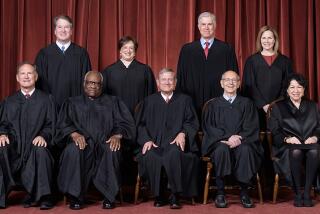Quattrone Defense to Target Judge
- Share via
Frank Quattrone, the highest-ranking securities executive to face prison since junk-bond pioneer Michael Milken, will try to overturn his obstruction-of-justice conviction by attacking evidence rulings by the presiding judge, his lawyer said Tuesday.
Jurors convicted Quattrone on obstruction-of-justice and witness-tampering charges Monday. His first trial ended in October with a hung jury.
Quattrone attorney John Keker and U.S. District Judge Richard Owen clashed throughout the retrial, as the defense repeatedly assailed the jurist’s rulings.
Keker complained last week about an “inequitable pattern of evidentiary rulings” by the judge that favored prosecutors. He said Owen didn’t allow the defense to question witnesses about what they were thinking, then permitted prosecutors to pose similar questions.
The odds are against the appeal succeeding. Last year, the U.S. 2nd Circuit Court of Appeals in Manhattan reversed only 20 of 1,934 convictions it reviewed and sent 228 criminal cases back to lower courts for more proceedings, according to a report for the U.S. courts.
Appellate courts usually defer to a trial judge’s rulings on evidence, defense lawyers not involved in the case say.
“You need to demonstrate that the judge made a decision about evidence that deprives you of your constitutional right to a fair trial,” said Jack Sylvia, an attorney with Mintz Levin Cohn Ferris Glovsky & Popeo in Boston. “It’s a fairly high threshold.”
Quattrone, scheduled to be sentenced Sept. 8, is expected to serve one to two years under federal sentencing guidelines.
Quattrone headed Credit Suisse First Boston’s technology unit in Palo Alto before resigning last year. As an investment banker with CSFB and other Wall Street firms, he oversaw the initial public offerings of Cisco Systems Inc., Amazon.com Inc. and other technology companies.
Milken, the former Drexel Burnham Lambert Inc. head of junk-bond trading, pleaded guilty to six counts of securities fraud in 1990, paid a $1-billion fine and served about two years in prison. He heads a nonprofit think tank in Santa Monica.
More to Read
Inside the business of entertainment
The Wide Shot brings you news, analysis and insights on everything from streaming wars to production — and what it all means for the future.
You may occasionally receive promotional content from the Los Angeles Times.










